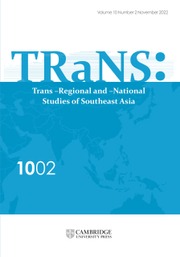Weber, Marx and Contemporary Thailand
Published online by Cambridge University Press: 13 August 2013
Abstract
Thailand's on-going political crisis began with agitation against the Thaksin Shinawatra-led government, saw a military coup and a spate of street-based protest and violence. Drawing on Marx and Weber and using the categories of class, status and party, it is argued that Thailand has reached a political turning point. Subaltern challenges to the hierarchical institutions of military, monarchy and bureaucracy appear to have resulted in political patterns of the past being set on a new trajectory. The social forces that congregate around old ideas associated with status honour – hierarchy, social closure and inequality, ‘Thai-style democracy’ and privilege – are challenged by those championing equality, access, voting and populism. While the balance of forces would suggest that an historical turning point has been achieved, reaction and unexpected outcomes remain possible.
- Type
- Articles
- Information
- Copyright
- Copyright © Institute of East Asian Studies, Sogang University 2013
References
- 7
- Cited by


